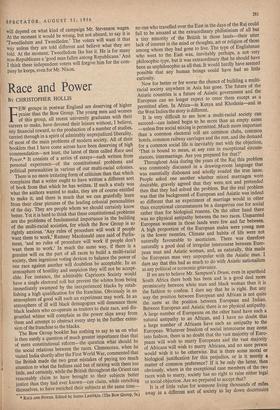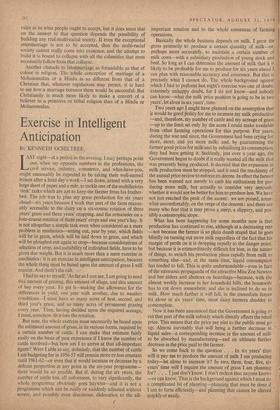Race and Power
BY CHRISTOPHER HOLLIS FEW groups in postwar England are deserving of higher praise than the Bow Group. The young men and women of this group, all recent university graduates with their careers to make, have devoted their leisure without, I believe, any financial reward, to the production of a number of studies, carried through in a spirit of admirably unprejudiced liberality, of most of the main problems of modern society. All of their booklets that I have come across have been deserving of high commendation—not least, the latest of them called Race and Power.* It consists of a series of essays—each written from personal experience—of the constitutional problems and political personalities in various of our multi-racial colonies.
There is no more irritating form of criticism than that which complains that a writer ought to have written a different sort of book from that which he has written. If such a study was what the authors wanted to make, they are of course entitled to make it, and there is much that we can gratefully learn from their clear pictures of the leading colonial personalities of the day. They are people whom we should certainly know better. Yet it is hard to think that these constitutional problems are the problems of fundamental importance in the building of the multi-racial societies, for which the Bow Group is so rightly anxious. 'Any rules of procedure will work if people want them to work,' Ramsay Macdonald once said of Parlia- ment, 'and no rules of procedure will work if people don't want them to work.' In much the same way, if there is a genuine will on the part of all races to build a multi-racial society, then ingenious voting devices to balance the power of one race against another will doubtless be acceptable. In an atmosphere of hostility and suspicion they will not be accept- able. For instance, the admirable Capricorn Society would have a single electoral roll but prevent the whites from being immediately swamped by the inexperienced blacks by estab- lishing a high qualification for the franchise. Obviously in an atmosphere of good will such an experiment may work. In an atmosphere of ill will black demagogues will denounce those black leaders who co-operate as traitors to their race, and dis- gruntled whites will complain as the power slips away from them and attempt to obstruct every step in the further exten- sion of the franchise to the blacks.
The Bow Group booklet has nothing to say to us on what is then surely a question of much greater importance than that of mere constitutional reform—the question what should be the social relations between the races. Clemenceau, when he visited India shortly after the First World War, commented that the British made the two great mistakes of paying too much attention to what the Indians said but of mixing with them too little, and certainly, while the British throughout the Orient can reasonably claim to have brought to their subjects better justice than they had ever known—can claim, while enriching themselves, to have enriched their subjects at the same time- no one who travelled over the East in the days of the Raj could fail to be amazed at the extraordinary philistinism of all but a tiny minority of the British in those lands—their utter lack of interest in the mind or thoughts, art or religion of those among whom they had gone to live. The type of Englishman who went to the East was, inevitably perhaps, a not very philosophic type, but it was extraordinary that he should have been as unphilosophic as all that. It would hardly have seemed possible that any human beings could have had so little curiosity.
Now for better or for worse the chance of building a multi- racial society anywhere in Asia has gone. The future of the Asiatic countries is a future of Asiatic government and the European can no longer expect to enter them except as a permitted alien. In Africa—in Kenya and Rhodesia—and in the West Indies the story is different.
It is very difficult to see how a multi-racial society can succeed—can indeed begin to be more than an empty name —unless free social mixing is permitted. Much more important than a common electoral roll are common clubs, common hotels, common railway carriages and the rest, and the demand for a common social life is inevitably met with the objection, 'That is bound to mean, at any rate in exceptional circum- stances, intermarriage. Are you prepared for that?'
Throughout Asia during the years of the Raj this problem was commonly discussed in a drawing-room language that was essentially dishonest and wholly evaded the true issue. People asked one another whether mixed marriages were desirable, gravely agreed that they were not and pretended then that they had solved the problem. But the real problem was that the background of European and Asiatic was indeed so different that an experiment of marriage would in other than exceptional circumstances be a dangerous one for social rather than for biological reasons. On the other hand there was no physical antipathy between the two races. Unmarried European women in those lands were few and far between. A high proportion of the European males were young men in the lower twenties. Climate and habits of life were not naturally favourable to asceticism. There was therefore naturally a good deal of irregular intercourse between Euro- pean man and Asiatic woman, and, as naturally, this made the European man very unpopular with the Asiatic man. I dare say that this had as much to do with Asiatic nationalism as any political or economic grievance.
If we are to believe Mr. Sampson's Drum, even in apartheid South Africa there both has been and is a good deal more promiscuity between white man and black woman than it is the fashion to confess. I dare say that he is right. But any way the position between European and African is not quite the same as the position between European and Indian. Between European and Asiatic there is no physical antipathy. A large number of Europeans on the other hand have such a natural antipathy to an African, and I have no doubt that a large number of Africans have such an antipathy to the European. Whatever freedom of social intercourse may come into fashion, there is no doubt that the vast majority of Euro- peans will wish to marry Europeans and the vast majority of Africans will wish to marry Africans, and no sane person would wish it to be otherwise. But is there some moral or biological justification for this prejudice, or is it merely a matter of common preference? If it be only the latter, then obviously, where in the exceptional case members of the two races wish to marry, society has no right to raise either legal or social objection. Are we prepared to accept that?
It is of little value for someone living thousands of miles away in a different sort of society to lay down doctrinaire rules as to what people ought to accept, but it does seem that on the answer to that question depends the possibility of building any real multi-racial society. If even the exceptional . intermarriage is not to be accepted, then the multi-racial society cannot really come into existence, and the attempt to build it is bound to collapse with, all the calamities that must necessarily follow from that collapse.
Another obstacle to intermarriage as formidable as that of colour is religion. The whole conception of marriage of a Mohammedan or a Hindu is so different from that of a Christian that, whatever regulations may permit, it is hard to see how a marriage between them would be successful. But Christianity is much more likely to make a convert of a believer in a primitive or tribal religion than of a Hindu or Mohammedan.



































 Previous page
Previous page